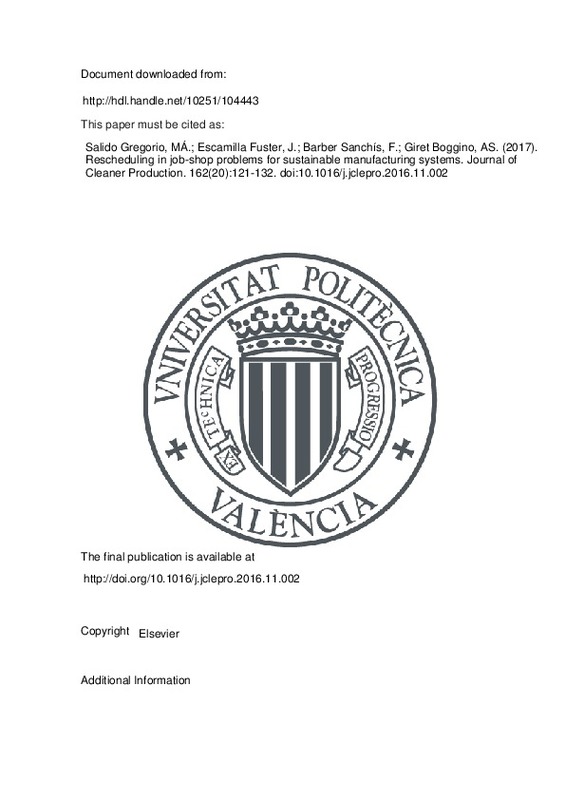JavaScript is disabled for your browser. Some features of this site may not work without it.
Buscar en RiuNet
Listar
Mi cuenta
Estadísticas
Ayuda RiuNet
Admin. UPV
Rescheduling in job-shop problems for sustainable manufacturing systems
Mostrar el registro sencillo del ítem
Ficheros en el ítem
| dc.contributor.author | Salido Gregorio, Miguel Angel
|
es_ES |
| dc.contributor.author | Escamilla Fuster, Joan
|
es_ES |
| dc.contributor.author | Barber Sanchís, Federico
|
es_ES |
| dc.contributor.author | Giret Boggino, Adriana Susana
|
es_ES |
| dc.date.accessioned | 2018-06-21T04:21:26Z | |
| dc.date.available | 2018-06-21T04:21:26Z | |
| dc.date.issued | 2017 | es_ES |
| dc.identifier.issn | 0959-6526 | es_ES |
| dc.identifier.uri | http://hdl.handle.net/10251/104443 | |
| dc.description.abstract | [EN] Manufacturing industries are faced with environmental challenges, so their industrial processes must be optimized in terms of both profitability and sustainability. Since most of these processes are dynamic, the previously obtained solutions cannot be valid after disruptions. This paper focuses on recovery in dynamic job-shop scheduling problems where machines can work at different rates. Machine speed scaling is an alternative framework to the on/off control framework for production scheduling. Thus, given a disruption, the main goal is to recover the original solution by rescheduling the minimum number of tasks. To this end, a new match-up technique is developed to determine the rescheduling zone and a feasible reschedule. Then, a memetic algorithm is proposed for finding a schedule that minimizes the energy consumption within the rescheduling zone but that also maintains the makespan constraint. An extensive study is carried out to analyze the behavior of our algorithms to recover the original solution and minimize the energy reduction in different benchmarks, which are taken from the OR-Library. The energy consumption and processing time of the tasks involved in the rescheduling zone will play an important role in determining the best match-up point and the optimized rescheduling. Upon a disruption, different rescheduling solutions can be obtained, all of which comply with the requirements but that have different values of energy consumption. The results proposed in this paper may be useful for application in real industries for energy-efficient production rescheduling. | es_ES |
| dc.description.sponsorship | This research has been supported by the Seventh Framework Programme under the research project TETRACOM-GA609491 and the Spanish Government under research projects TIN2013-46511-C2-1, TIN2015-65515-C4-1-R and TIN2016-80856-R. The authors wish to thank reviewers and editors for their positive comments to improve the quality of the paper. | en_EN |
| dc.language | Inglés | es_ES |
| dc.publisher | Elsevier | es_ES |
| dc.relation.ispartof | Journal of Cleaner Production | es_ES |
| dc.rights | Reserva de todos los derechos | es_ES |
| dc.subject | Manufacturing problem | es_ES |
| dc.subject | Multi-objective | es_ES |
| dc.subject | Rescheduling | es_ES |
| dc.subject | Memetic algorithm | es_ES |
| dc.subject | Energy consumption | es_ES |
| dc.subject.classification | LENGUAJES Y SISTEMAS INFORMATICOS | es_ES |
| dc.title | Rescheduling in job-shop problems for sustainable manufacturing systems | es_ES |
| dc.type | Artículo | es_ES |
| dc.identifier.doi | 10.1016/j.jclepro.2016.11.002 | es_ES |
| dc.relation.projectID | info:eu-repo/grantAgreement/MINECO//TIN2015-65515-C4-1-R/ES/ARQUITECTURA PERSUASIVA PARA EL USO SOSTENIBLE E INTELIGENTE DE VEHICULOS EN FLOTAS URBANAS/ | es_ES |
| dc.relation.projectID | info:eu-repo/grantAgreement/EC/FP7/609491/EU/Technology Transfer in Computing Systems/ | |
| dc.relation.projectID | info:eu-repo/grantAgreement/MINECO//TIN2016-80856-R/ES/TECNOLOGIAS INTELIGENTES PARA LA RESOLUCION CENTRALIZADA Y DISTRIBUIDA DE PROBLEMAS DE SCHEDULING SOSTENIBLE EN PROCESOS INDUSTRIALES Y LOGISTICOS/ | es_ES |
| dc.rights.accessRights | Abierto | es_ES |
| dc.date.embargoEndDate | 2019-01-01 | es_ES |
| dc.contributor.affiliation | Universitat Politècnica de València. Departamento de Sistemas Informáticos y Computación - Departament de Sistemes Informàtics i Computació | es_ES |
| dc.description.bibliographicCitation | Salido Gregorio, MA.; Escamilla Fuster, J.; Barber Sanchís, F.; Giret Boggino, AS. (2017). Rescheduling in job-shop problems for sustainable manufacturing systems. Journal of Cleaner Production. 162(20):121-132. https://doi.org/10.1016/j.jclepro.2016.11.002 | es_ES |
| dc.description.accrualMethod | S | es_ES |
| dc.relation.publisherversion | http://doi.org/10.1016/j.jclepro.2016.11.002 | es_ES |
| dc.description.upvformatpinicio | 121 | es_ES |
| dc.description.upvformatpfin | 132 | es_ES |
| dc.type.version | info:eu-repo/semantics/publishedVersion | es_ES |
| dc.description.volume | 162 | es_ES |
| dc.description.issue | 20 | es_ES |
| dc.relation.pasarela | S\320608 | es_ES |
| dc.contributor.funder | RWTH Aachen University | es_ES |
| dc.contributor.funder | European Commission | |
| dc.contributor.funder | Ministerio de Economía y Competitividad | es_ES |







![[Cerrado]](/themes/UPV/images/candado.png)

